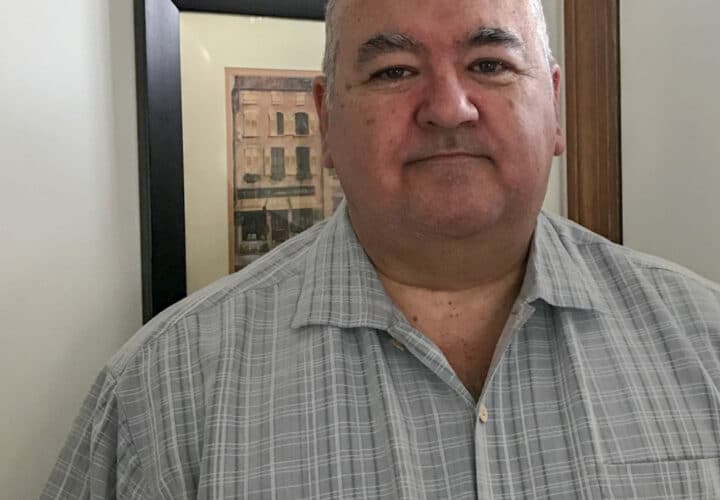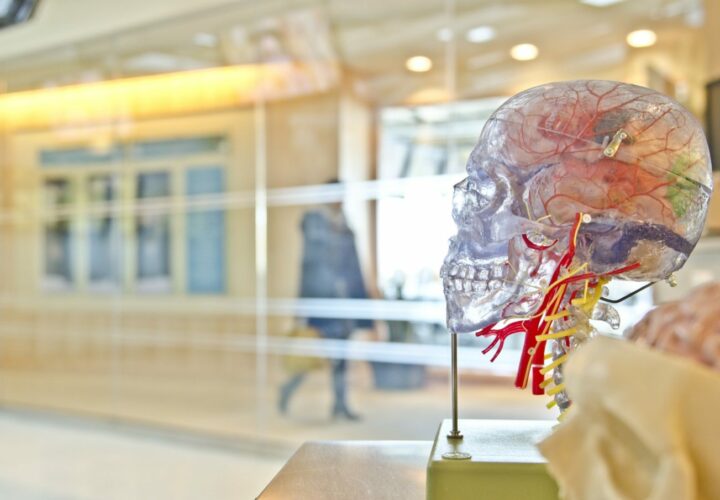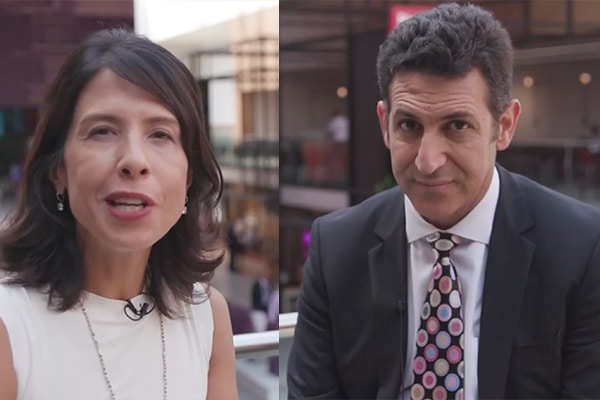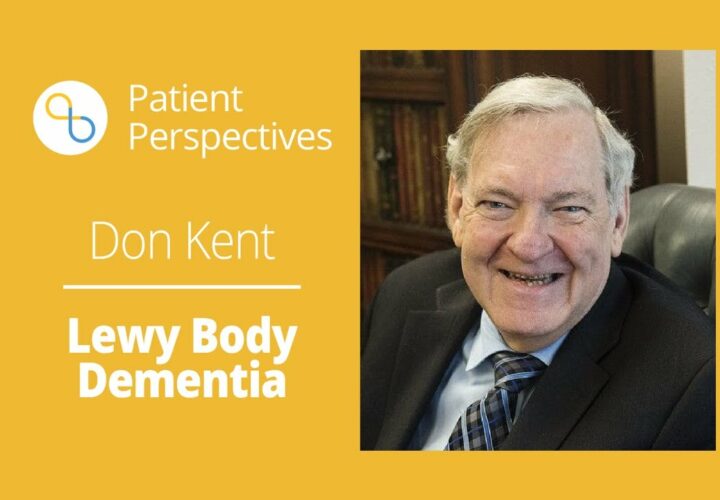Painter, avid cook, and patient advocate Michael Belleville was told he had Alzheimer's. He discovered he was misdiagnosed. He shares his story, his early signs of Lewy body dementia, and what changed doctors' minds about his diagnosis.
Lewy body dementia is the second most common form of dementia. Where Alzheimer’s disease makes up 70 percent of dementia cases, Lewy body makes up as much as 15 percent. In a survey, the Lewy Body Dementia Association found that 80 percent of participants with LBD were misdiagnosed — and it took about three doctors to accurately diagnosis the condition. Painter, avid cook, and patient advocate Michael Belleville was diagnosed with younger-onset Alzheimer’s at 52 years old, but later learned he was, in fact, living with LBD.
Belleville says his neurologist realized he likely has LBD, not Alzheimer’s, after he was diagnosed with REM sleep behavior disorder and experienced hallucinations early in his diagnosis. While there are no specific medications to treat LBD, he takes medication that is often prescribed to Alzheimer’s and Parkinson’s patients.
He joined Being Patient in 2019 to talk about share what he suggests doctors keep in mind when giving dementia diagnoses — and how to live well with LBD.
Being Patient: Many people with Lewy body dementia or other forms of dementia say that it took them four or five years to get a diagnosis. Can you tell us about your experience?
Michael Belleville: Sure, I had actually been seeing a neurologist for other issues that were happening that we just couldn’t understand. We didn’t know what was going on and we started telling him some of the things that were happening at work or that I was getting lost coming home and pulling into someone else’s driveway. Initially, like most people who have this disease, I was told it was depression, so you have to go see a psychiatrist and that takes months. Then I was told it was Lyme disease, and then it goes on and on until ultimately, we finally got a diagnosis of younger-onset Alzheimer’s. We sought a second opinion at Mass General Hospital. We went there and they confirmed the diagnosis and it stayed that way for about two or three years.
Being Patient: At that point, did you feel like your memory was getting worse?
Michael Belleville: The funny thing is that the things that showed up first weren’t just about memory. They were a little bit, but that wasn’t the predominant thing that was happening to me. Something that was happening more was my inability to multitask the way I used to be able to. I was an inside communication technician for Verizon for nearly 20 years and the job involved a lot of critical thinking at times. You had to be really on top of your game and if you made mistakes, it could affect a lot of people. There was not a lot of room for error. I’d have two computer screens going and I could bounce from A to B and know exactly what I was building from one to another, but that ability started to suffer because I was losing my focus and concentration on what the heck I was doing to begin with. My job performance started to go down and I actually found myself talking to co-workers who I had actually initially trained. I was one of the trainers and I’d have to ask them how to do certain parts of my job that I just couldn’t wrap my head around.
That was one part, but the other part was changes in my personality. I was a very low-key kind of guy, I loved to laugh, and that part didn’t change too much, but I was starting to become angrier and frustrated more quickly, I was losing my patience a lot easier, and interest in a lot of the things that I enjoyed doing. It’s kind of ironic, it really kind of showed itself at work more than it did at home in the beginning, or so we thought, because I’d get home from work and my wife and the kids just thought that I had a bad day at work and attributed my mood changes or tendency to be so snappy to stress, even though I typically wouldn’t act that way. That’s how it presented itself in the beginning.
Being Patient: How did the doctor diagnose you with early-onset Alzheimer’s at that time?
Michael Belleville: Most people have what they call an ‘a-ha moment.’ Fortunately, I have a very loving wife—next month, it will be 38 years we’ve been married. At the time, like most married couples, you still have disagreements and arguments, but apparently, we had a pretty rough argument and the thing that made it different was that the following morning when I woke up and got the cold shoulder from my wife, I had no recollection as to why, which kind of made her a little angrier at first, until she saw I was really sincere. I had no recollection of the conversation at all. She told me some of the things I had said to her, things I would never dream of telling her at all, and that was a wake-up call for us. We knew this wasn’t stress, it wasn’t Lyme disease, it wasn’t whatever they thought it was, so that’s when we approached our neurologist again.
We said, “Hey, listen, there’s something more serious going on here.” That’s when he changed directions. I went for a neuropsychological exam, I went for spinal taps, MRIs and PET scans, and all those tests started coming back. I never had the amyloid-plaque PET scan mainly because the insurance company wouldn’t pay for it, but the MRI showed some abnormalities, the SPECT scan showed abnormalities, the spinal tap, as well as the neuropsychological exam. Every single one of them all came back and said probable neurological disorder, probable Alzheimer’s, and again, they are never going to come right out and tell you with 100 percent certainty that it’s Alzheimer’s.
Being Patient: How did you do on the neuropsychological test?
Michael Belleville: I did not do very well in the cognitive testing at all, as well as some of the memory areas. I still have challenges with that today. I went to see my neurologist that I now have at Mass General and there’s been a progression just from last year to this year as far as the numbers and the way things look. So that part of it does exist. I think it’s typical for some people with Alzheimer’s versus Lewy body, but with Alzheimer’s, the short-term memory issues are more prominent. However, I do have some short-term memory issues, but they’re not as severe.
Being Patient: How long did it take to discover that you have Lewy body dementia, not early-onset Alzheimer’s?
Michael Belleville: The time it took to get my first initial diagnosis was a couple of years, if not longer, because again, they thought it was depression, so you go through that procedure for six months or longer, and then they thought it was something else and that takes longer. The time it went from me being diagnosed with early-onset Alzheimer’s to learning I have Lewy body dementia was about two and a half years.
Being Patient: What caused a doctor to change your diagnosis?
Michael Belleville: Ironically, I had to change neurologists because the one I had been seeing at Mass General moved across the country. He referred me to someone else. He was a very, great qualified doctor and a good friend of his. It was during our first interview that we really went more in-depth than we did with the first doctor because other things started showing up, so they talked to me and then they talked to my wife separately, and things were happening that weren’t necessarily happening as much as they were in the beginning: things like hallucinations. People say, “Well, people with Alzheimer’s also have hallucinations,” and they do, but it’s usually further along in the progression, not as early as it is with Lewy body dementia.
One of the hallmarks for Lewy body dementia is what they call REM sleep behavior disorder and I’m probably not going to get this 100 percent right, but what happens to someone without this disorder is that you fall asleep and your brain sends your body a signal that basically paralyzes you when you get into REM sleep so that when you’re having those dreams, you’re not acting out your dreams, your body’s paralyzed. When you have REM sleep behavior disorder, you’re not getting that signal, so when you’re having the dream—and they’re always confrontational, not very pleasant dreams—you actually act them out by punching things, kicking, falling on the floor, I knocked over my nightstand and walked into a wall, because I wasn’t getting that signal. I was officially diagnosed with REM sleep behavior disorder at Mass General during a sleep study. That is one defining characteristic of Lewy body dementia and I’ve been told that if you have RBD, there’s a very high likelihood that you will develop or have Lewy body dementia.
Being Patient: What does it mean to live with Lewy body dementia?
Michael Belleville: All forms of dementia are horrible diseases, but I think what makes Lewy body dementia a little more challenging is that it affects so many different parts of your body. It affects your personality and who you are as a person. I have mood changes up and down, depression and can feel really low. With Lewy body, there’s a lot of peaks and a lot of valleys. One day, I could be absolutely great, my cognition is perfect, I look at myself and think, “What am I doing at home? I should be at work or at least behind the wheel driving a car” and then four hours later, I hit that wall where things just kind of slow down, and I can’t say exactly how it is for Alzheimer’s, but I don’t think they have as many peaks and valleys as someone who’s living with Lewy body dementia does.
It’s just something that’s completely misunderstood because a lot of what happens could be mistaken for someone thinking, “Here’s a not-pleasant person,” but if they had seen me three hours earlier, they would’ve seen a completely different person.
Being Patient: How did you feel after receiving a new diagnosis and living for two years thinking you had early-onset Alzheimer’s?
Michael Belleville: When we were first told it was Alzheimer’s, we were baffled and had the same stereotypes that everyone else does: That’s an old person’s disease; I’m too young for that; I don’t have that big of a problem with my memory. At the same time, there was this little tiny sense of relief that didn’t last very long that at least we knew what was going on.
Once we learned more about the disease and how devastating it is, that goes right by the wayside. It was almost the same way when I found out that it was Lewy body because there were so many other little things that were happening like the hallucinations, the Parkinsonism symptoms and problems with my balance — I’ve been using a cane for a little over a year now, not because I have joint problems, but sometimes, I could just tip over.
There’s all those other little things that Lewy body presents itself with that’s different from other forms of dementia. I don’t want to make it sound like it’s worse than other types, but it’s certainly not a pleasant experience all the time.
Being Patient: How do they treat Lewy body dementia?
Michael Belleville: There are no specific medications that treat Lewy body. I’m being given the same two medications that I was given for Alzheimer’s. Right now, that’s mainly because there are only four F.D.A. approved medications for dementia itself and they’re primarily approved for Alzheimer’s, but the doctors don’t have anything else to give you, so they want to try and give you something. Right now, I’m taking Aricept and Namenda, and a Parkinson’s medication as well.
Being Patient: A pathologist mentioned that 75 percent of autopsies he does on people with dementia show that they had Alzheimer’s and another form of dementia. Do you feel confident that you have Lewy body now that you’ve gotten that diagnosis?
Michael Belleville: Absolutely. When they first told me what it was, like everybody else, I was like what the heck is that? But the more you do research on it, and the first time I read something, I think it was on the Mayo Clinic website, it was like I was reading a book about myself, about the signs and symptoms and things that were going on with me. I had my wife Cheryl read it as well to make sure it wasn’t just me and she read it and agreed with it. It’s so hard with any kind of dementia because they just don’t know. They really don’t know. Could it be mixed dementia? It probably is. It very well could be. And I think that is the case with a lot of people which makes it that much harder to not even diagnosis, but to treat.
One of the things that’s really important with getting a diagnosis of Lewy body versus Alzheimer’s or another form of dementia is that certain drugs they give you could actually have more harmful effects or even be deadly for someone with Lewy body dementia, including antipsychotic drugs like Haldol that they give to someone with Alzheimer’s. If you give that to a person with Lewy body, it actually exacerbates the symptoms, it doesn’t make them go away, and they could do more harm than good.
Being Patient: Since you’ve been on this journey, what would be your advice to others who are going through a similar experience or think they may have been misdiagnosed?
Michael Belleville: I think it would’ve started with what my good friend calls Day zero, and that’s the day you get your diagnosis. You could talk to 1,000 people who have gotten a dementia diagnosis and you’d probably get very similar answers. We were given the diagnosis by a very well-qualified neurologist, a very nice gentleman, and we’re still actually good friends with him to this day, but the way we got our diagnosis was: “Here’s what all the test results show. I’m pretty sure you have younger-onset Alzheimer’s or dementia of the Alzheimer’s type. Here’s the medication I want to start you on. See you in six months.” And then he walked out the door and that was it. There were no referrals to support groups or any types of organizations, nothing about what you should do next. I’ve talked to people who have gotten worse diagnoses and they’re told: “Go home and get your affairs in order.” You’re pretty much given a death sentence.
Obviously, yes, this diagnosis is terminal, but I like to tell folks, you get a prescription for a medication and I think one of the first prescriptions they should be giving people with a dementia diagnosis is for social engagement: to stay active, engaged and doing something, whatever it is you love to do. For people it could be gardening, painting, photography, volunteering somewhere. You don’t need to go home, close the door and that’s the end of it, then wait for it to happen. You can still live a meaningful, purposeful life.
I think that’s sadly not talked about, especially with doctors who give patients a diagnosis. Had he done that, he would’ve saved me five or six months of my life, because for the first five or six months, I was hiding under a rock. I really was. I was depressed already, being treated for depression, but it got even worse. I was out of work at the time, I decided to go back to work, to work for as long as I could. Fortunately, I had a great boss who made that possible, even though I couldn’t drive anymore. I basically went to work, came home, ate, went to bed. I wasn’t doing anything. I stopped going out to visit people. It meant ninety-eight percent of what I was doing just stopped and it wasn’t until I met other people who were living the same journey in the support group that I developed a camaraderie with that made me realize that I wasn’t alone. And I think that’s the hardest part: You think you’re alone in this. You’re not, you’re truly not alone.
Being Patient: With LBD, you’re dealing with Parkinson’s and dementia symptoms. Do you think doctors are equipped to deal with LBD and have you spoken to any experts?
Michael Belleville: Fortunately, I have talked to a few. But to answer your question, no, I don’t think there are enough. I think part of the problem is that it all comes down to research funding. With the amount of money that’s going into the research, which is phenomenal, 90 percent of it is all geared towards Alzheimer’s. Again, I’m not trying to take away how bad Alzheimer’s is. I have very dear friends who passed away from Alzheimer’s. Of course, I want to see a cure for that. But if the NIH isn’t putting out research grants for funding Lewy body dementia, you’re not going to have researchers or doctors who want to invest their time into even looking at it.
Being Patient: After you’ve gotten a diagnosis, you could offer so much advice to doctors. What advice would you give doctors who are handling a case like yours?
Michael Belleville: I’ve been fortunate in that the doctor I have at Mass General talks and listens to me. When I first go for my appointment, I go in a separate room, they do the cognitive testing and everything else, and then they have my wife go into another room and they talk to her about what’s really going on. Then we get together, but at least I have a doctor who talks to me and asks me how I’m doing. He talks to me as if I’m in the room and you would think that’s common sense. Unfortunately, that doesn’t always happen. A lot of times doctors will talk right past the person living with the disease and talk to the caregiver as if they’re not even in the room with them.
Be inclusive. Yes, we have this disease, but the majority of people living with any form of dementia still want to be included in every part of the decision making for as long as we can. We still have a voice. We still need to be heard. And we need to be taken seriously. There are too many situations where you hear about committees or organizations being formed for dementia and they have 10 or 15 people on the committee, but then you look at it, and there’s no one person living with the disease who’s on the committee. And you sit back and wonder, “Why? What the heck’s going on?” Is it because they don’t think that we’re capable enough to still have a voice? Obviously, someone who may have progressed further on may not be able to do that, but for someone who’s still capable of communicating well and offering ideas and opinions, to not even consider including them is a travesty.
Being Patient: You’re a great painter and cook. Have you found art to be therapeutic for you since your diagnosis?
Michael Belleville: Yes. There are so many myths and stigmas about this disease. You’re told so many things, like you can’t learn new things and that’s so far from the truth. Since I’ve retired, I learned that I love to cook. I’m not allowed to touch the stove when my wife’s not home, but it’s something that we do together. I’ve also recently started painting in the last year. It’s 100 percent therapeutic. I don’t believe I have what people refer to as sundowning, but there are times, especially in the early to mid-afternoon where I get very agitated and nervous and I’ve found that if I focus on drawing or painting or something that helps relax me and puts me in a zone so to speak like it would anyone else, it just helps come me down. I’d never painted before. I’d always been able to draw when I was a kid, like Disney cartoons and things like that, but painting always intimidated me for some reason. I couldn’t grasp layering and things like that.
The first thing I did after I retired from work permanently, I walked into my local senior center in Douglas, Massachusetts and asked them who they had that was helping seniors with technology issues. At the time, they didn’t have anyone, so I volunteered. We started a group, met every Thursday, and I got some adopted grandparents, aunts, uncles and whoever. The class they had right after mine was a painting class and I kept being encouraged to stick around. One day, I finally did and found out that this was fun and I have a talent for it. It is very therapeutic. It helps me a lot.
This interview has been edited for length and clarity.






Very informative! My Mother and my father-in-law had Alzheimers, leaving my child and children at risk. At 85 with no symptoms and “ COVID depressed” from virtually isolating my extroverted self for over three years, I am anxious about Alzheimers for myself and them.
My grandmother had LBD many years ago when nobody had ever heard of it. I was a practicing RN and hadn’t at that time! The docs always said it was not familial and we always held on to that. Now my 86 yr old mother has started hallucinating and having severe sleep behaviors as well as rapidly declining memory, getting lost, etc. Total deja vu! Are there any family/genetic studies going on that myself and my siblings could take part in? Any new scans that give more diagnostic information?